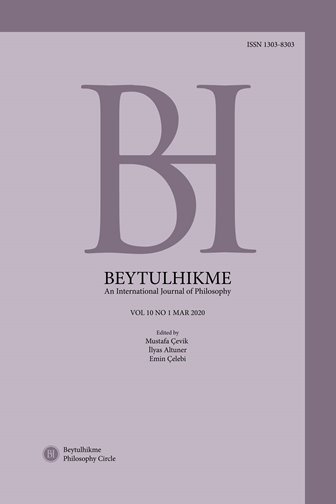Author :
Abstract
Trajik karakterler kazanamayacakları savaşlarla savaşırlar. Onlardan kahramanlar yapan şey budur. Bununla birlikte, klasik ve modern trajedi, yeterli aklın rasyonalist ilkesinden yetersiz aklın felsefi değişiminde fay çizgisi bulunan ontolojik farklılıkları göstermektedir. Bu nedenle, hayat, tanrıların gazabının, insanın başarısızlığının sıradan sonucu haline gelmesi için dayattığı bir zorunluluk olmaktan çıkar. Bu göz önüne alındığında, makale Yunanca hamartia teriminin klasik ve modern drama ekonomisinde üstlendiği farklı etkileri ve Weltanschauung'un eşdeğer yeniden tanımlanmasını ele alacaktır. Modernite, klasiklerin kozmik aralığına sahip değildir, bu nedenle kader hakkında suçluluk hakkında olduğundan daha azdır.
Keywords
Abstract
Tragic characters fight battles they cannot possibly win. That is what makes heroes out of them. However classical and modern tragedy display ontological differences whose fault line is to be found in the philosophical shift from the rationalist principle of sufficient reason to that of insufficient reason. Hence, life ceases to be a necessity imposed by the wrath of the gods to become the ordinary outcome of man’s failure. Given that, the paper will consider the different implications the Greek term hamartia assumes in the economy of classical and modern drama, and the equivalent redefinition of Weltanschauung. Modernity does not have the cosmic range of the classics, thus it is less about fate than it is about guilt.
Keywords
- Adkins, A. W. H. (1960). Merit and Responsibility: A Study in Greek Values. Oxford: Clarendon Press.
- Aristotle (1997). Poetics. (Trans. G. Whalley). Montreal & Bufalo: MacGill & Queen’s University Press.
- Barth, J. (1984). The Literature of Replenishment. The Friday Book: Essays and Other Non-Fiction. London: The John Hopkins University Press.
- 17 In The Greek and the Irrational professor Doods traces the origin of the phenomenon back to the Greek society in the third century B.C.: “For the refusal of responsibility in any sphere there is always a price to be paid, usually in the form of neurosis (…) The centuries of rationalism had weakened their social influence and thus, indirectly, their power over the individual” (cfr. 1951, Ch. VII, 247). Surely, the West has been subjected to a process of secularization that began with Socrates, became official with the enlightened philosophy of Descartes, and took finally shape with the latest Marxist historical materialism. Simultaneously, the philosophical death of God generates nihilist shipwrecks that the twentieth century failed to solve.
- Block, H. M. (1972). Some Notes on the Problem of Modern Trage- dy. Comparative Literature Studies, 9 (1), 80-84.
- Bremer, J. M. (1969). Hamartia. Amsterdam: Adolf M. Hakkert.
- Bushnell, R. (Ed.) (2005). A Companion to Tragedy. Oxford: Blackwell.
- Cairnus, D. (Ed.) (2013). Tragedy and Archaic Greek Thought. Edinburgh: Classical Press of Wales.
- Camus, A. (1989). The Myth of Sisyphus. (Trans. D. O’Brian). New York: Vintage Books.
- Dodds, E. R. (1951). The Greeks and the Irrational. Berkeley: University of California Press.
- Dostoevsky, F. (1994). The Karamazov Brothers. (Trans. C. Garnett). Oxford: Oxford University Press.
- Euripides (2007). Alcestis, Medea, Hippolytus. (Trans. D. A. Svarlien). Indianapolis: Hackett Publishing Company.
- Hegel, G. W. F. (1975). Aesthetics: Lectures on Fine Art, 2 vols. (Trans. T. M. Knox). Oxford: Clarendon Press.
- Ibsen, H. (1978). The Complete Major Prose Plays. (Trans. R. Fjelde). New York: A Plume Book.
- Kimmelman, G. (1946). The Concept of Tragedy in Modern Criticism. The Jour- nal of Aesthetics and Art Criticism, 4 (3), 141-160.
- Knights, L. C. (1958). Explorations: Essays in Criticism Mainly on the Literature of the Seventeenth Century. London: Chatto & Windus.
- Malraux, A. (1949). Psychologie de l'Art. Paris: Skira.
- Miller, A. (1967). Collected Plays. New York: The Viking Press.
- Miller, A. (1981). Tragedy and Common Man. Tragedy: Vision and Form. (Ed. R. Willoughby). New York: Harper.
- Miller, A. (1984). Salesman in Beijing. New York: Penguin Books.
- Miller, A. (1998). Death of a Salesman. New York: Penguin Books.
- Palmer, R. H. (1992). Tragedy and Tragic Theory: An Analytical Guide. Westport: Greenwood Press.
- Roche, M. W. (2015). Introduction to Hegel's Theory of Tragedy. PhaenEx: Jour- nal of Existential and Phenomenological Theory and Culture, 1 (2), 11-20.
- Roudane, M. C. (1987). Conversations with Arthur Miller. Jackson: University Press of Mississippi.
- Ruskin, J. (2009). Modern Painters. London: Bibliolife.
- Sartre, J.-P. (2007). Existentialism is a Humanism. (Trans. C. Macomber). New Haven: Yale University Press.
- Shaw, G. B. (1994). The Quintessence of Ibsenism. New York: Dover Publication.
- Shepherd-Barr, K. (2006). Science on Stage: From Doctor Faustus to Copenhagen. Princeton: Princeton University Press.
- Sophocles (2013). Antigone, Oedipus the King, Oedipus at Colonus. (Eds. D. Grene & R. Lattimore). Chicago: University of Chicago Press.
- Steiner, G. (2004). Tragedy, Reconsidered. New Literary History, 35 (1), 1-15.
- Stinton, T. C. W. (1975). Hamartia in Aristotle and Greek Tragedy. The Classical Quarterly, 25 (2), 221-254.





